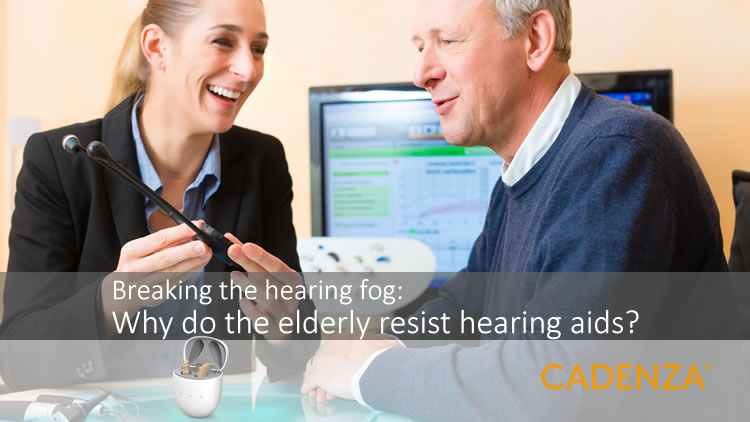Breaking the hearing fog: Why do the elderly resist hearing aids?
Hearing impairment seriously affects the daily life and work of hearing-impaired patients. Choosing suitable hearing aids is a helpless choice for most hearing-impaired patients. However, due to various factors, a small number of hearing-impaired patients fail to achieve the ideal hearing aid effect, which has caused some hearing-impaired patients and their families to have misunderstandings and prejudices about hearing aids, thus losing confidence in choosing hearing aids and having concerns about not wanting to choose hearing aids.

No matter how good the hearing aid is, it is not as good as the original ear
Hearing aids are by no means "omnipotent". They cannot be perfect and cannot solve all the problems of deaf patients. For example, the frequency response range of normal people's hearing is from 20Hz to 20KHz, while the frequency response range of hearing aids can only be from 100Hz to 8000Hz, which is already very good. In this sense, no matter whether it is a programmable or pre-programmed OTC hearing aid, no matter how good the hearing aid is, it is not as good as the original ear. It can only be said that the better the performance of the hearing aid, the closer the hearing aid effect is to normal hearing. No matter how good the hearing aid is, the deaf patient will not get better hearing than normal people.

Scientifically and objectively look at hearing loss and hearing aid effects
Most people think that wearing hearing aids will no longer have hearing impairments. The idea is completely unrealistic. The level of hearing loss, duration of hearing loss, nature of hearing loss and other factors of each hearing-impaired patient will affect the hearing aid effect of hearing-impaired patients. We should look at hearing loss and hearing aid effects scientifically and objectively, actively cooperate with the work and guidance of hearing aid fitters, and strive to achieve good hearing effects. The factors that cause concerns among hearing-impaired patients (especially the elderly) are mainly the following:

Concerns of the elderly who are unwilling to choose hearing aids
- 1. Severe hearing loss or long-term hearing loss, which has been more than ten years or decades; obvious hearing degeneration, low speech recognition rate, resulting in poor hearing aid effect, and dissatisfaction with the listening effect of the first hearing aid, which will cause loss of confidence in hearing aids and concerns about not wanting to wear hearing aids.
- 2. Due to the lack of professional fitters or unsuitable hearing aid products when choosing hearing aids for the first time, there will be a loss of confidence in hearing aids and concerns about not wanting to choose hearing aids again.
- 3. Due to economic conditions or too frugal living, the elderly are unwilling to spend more money. The elderly who can make do with what they can or have a quieter mind have concerns about not wanting to choose hearing aids and do not cause trouble for their children.
- 4. Remarks on the Internet or hearsay, negative publicity from relatives and friends, and interference from children all make elderly hearing-impaired patients have concerns about not wanting to choose hearing aids.
- 5. The concerns about wearing hearing aids arise due to sick relatives at home or the need to support the study and life of children or grandchildren.
In fact, for hearing-impaired patients, it is more important to solve the problem of hearing impairment for the hearing-impaired patients themselves or their families. The benefits are as follows:

- Benefit 1: Hearing-impaired patients can choose suitable hearing aids, which can make hearing-impaired patients more relaxed in work and life, and can obtain benefits that are ten or hundreds of times higher than the price of hearing aids.
- Benefit 2: Make the daily communication of hearing-impaired patients clearer, and the hearing of both ears becomes more sensitive through long-term sound stimulation; make the brain thinking more active. The mood will also become happier and happier; reduce the incidence of Alzheimer's disease or various diseases.
- Benefit 3: Choosing suitable hearing aids helps to protect the hearing of both ears and delay the risk of hearing loss. Improve the balance sense of both ears and the directionality of the sound source.
- Benefit 4: Choosing suitable hearing aids is not just buying a pair of electronic products, but buying a pair of ears and a good hearing.

Do a good job of ideological work for the elderly and let them accept hearing aids. Let the elderly know that hearing aids can bring convenience to life and improve communication; in this way, the elderly can know the benefits of hearing aids and will not think that hearing aids are useless. The elderly have worked hard all their lives, and it is time for them to enjoy their old age at home after retirement. However, the elderly cannot hear well, and even communication becomes a problem, so how can they enjoy it?
- Recent Posts
- OTC hearing aids: opening a new era of convenient hearing
- New Market Opportunity: OTC Hearing Aids Lead Retail Revolution and Help Expand Your Business
- Embrace the Future of Hearing Solutions: OTC Hearing Aids Let You Enjoy Clear Hearing with Ease
- What Is the Number One Rated Hearing Aid? It’s the Cadenza Fi6.
- Cadenza W3 Bluetooth hearing aids
- How much does a CIC hearing aid cost?
- What are the features and benefits of oily ears?
- How to choose an OTC hearing aid brand that suits the needs of the European and American markets?
- Can hearing aids treat deafness?
- Types of Hearing Aids
- BTE hearing aids
- ITE hearing aids
- Instant fit CIC hearing aids
- Rechargeable hearing aids
- RIC hearing aids
